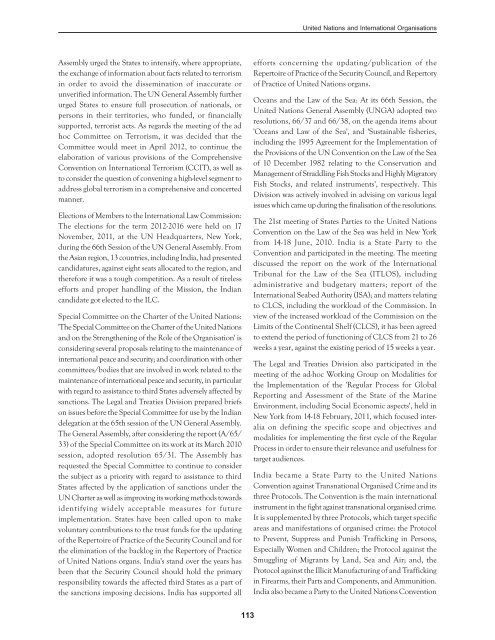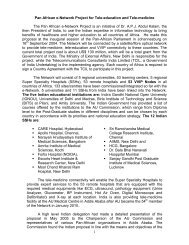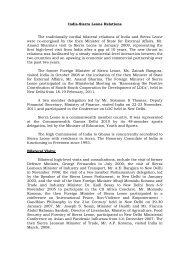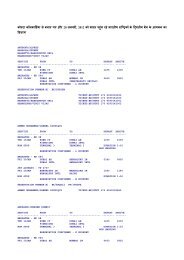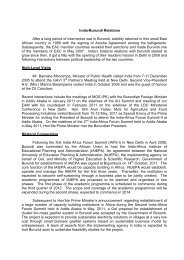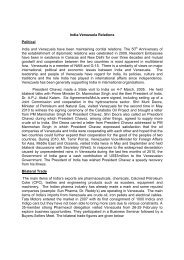Annual Report 2011 - 2012
Annual Report 2011 - 2012
Annual Report 2011 - 2012
You also want an ePaper? Increase the reach of your titles
YUMPU automatically turns print PDFs into web optimized ePapers that Google loves.
Assembly urged the States to intensify, where appropriate,<br />
the exchange of information about facts related to terrorism<br />
in order to avoid the dissemination of inaccurate or<br />
unverified information. The UN General Assembly further<br />
urged States to ensure full prosecution of nationals, or<br />
persons in their territories, who funded, or financially<br />
supported, terrorist acts. As regards the meeting of the ad<br />
hoc Committee on Terrorism, it was decided that the<br />
Committee would meet in April <strong>2012</strong>, to continue the<br />
elaboration of various provisions of the Comprehensive<br />
Convention on International Terrorism (CCIT), as well as<br />
to consider the question of convening a high-level segment to<br />
address global terrorism in a comprehensive and concerted<br />
manner.<br />
Elections of Members to the International Law Commission:<br />
The elections for the term <strong>2012</strong>-2016 were held on 17<br />
November, <strong>2011</strong>, at the UN Headquarters, New York,<br />
during the 66th Session of the UN General Assembly. From<br />
the Asian region, 13 countries, including India, had presented<br />
candidatures, against eight seats allocated to the region, and<br />
therefore it was a tough competition. As a result of tireless<br />
efforts and proper handling of the Mission, the Indian<br />
candidate got elected to the ILC.<br />
Special Committee on the Charter of the United Nations:<br />
'The Special Committee on the Charter of the United Nations<br />
and on the Strengthening of the Role of the Organisation' is<br />
considering several proposals relating to the maintenance of<br />
international peace and security; and coordination with other<br />
committees/bodies that are involved in work related to the<br />
maintenance of international peace and security, in particular<br />
with regard to assistance to third States adversely affected by<br />
sanctions. The Legal and Treaties Division prepared briefs<br />
on issues before the Special Committee for use by the Indian<br />
delegation at the 65th session of the UN General Assembly.<br />
The General Assembly, after considering the report (A/65/<br />
33) of the Special Committee on its work at its March 2010<br />
session, adopted resolution 65/31. The Assembly has<br />
requested the Special Committee to continue to consider<br />
the subject as a priority with regard to assistance to third<br />
States affected by the application of sanctions under the<br />
UN Charter as well as improving its working methods towards<br />
identifying widely acceptable measures for future<br />
implementation. States have been called upon to make<br />
voluntary contributions to the trust funds for the updating<br />
of the Repertoire of Practice of the Security Council and for<br />
the elimination of the backlog in the Repertory of Practice<br />
of United Nations organs. India's stand over the years has<br />
been that the Security Council should hold the primary<br />
responsibility towards the affected third States as a part of<br />
the sanctions imposing decisions. India has supported all<br />
113<br />
United Nations and International Organisations<br />
efforts concerning the updating/publication of the<br />
Repertoire of Practice of the Security Council, and Repertory<br />
of Practice of United Nations organs.<br />
Oceans and the Law of the Sea: At its 66th Session, the<br />
United Nations General Assembly (UNGA) adopted two<br />
resolutions, 66/37 and 66/38, on the agenda items about<br />
'Oceans and Law of the Sea', and 'Sustainable fisheries,<br />
including the 1995 Agreement for the Implementation of<br />
the Provisions of the UN Convention on the Law of the Sea<br />
of 10 December 1982 relating to the Conservation and<br />
Management of Straddling Fish Stocks and Highly Migratory<br />
Fish Stocks, and related instruments', respectively. This<br />
Division was actively involved in advising on various legal<br />
issues which came up during the finalisation of the resolutions.<br />
The 21st meeting of States Parties to the United Nations<br />
Convention on the Law of the Sea was held in New York<br />
from 14-18 June, 2010. India is a State Party to the<br />
Convention and participated in the meeting. The meeting<br />
discussed the report on the work of the International<br />
Tribunal for the Law of the Sea (ITLOS), including<br />
administrative and budgetary matters; report of the<br />
International Seabed Authority (ISA); and matters relating<br />
to CLCS, including the workload of the Commission. In<br />
view of the increased workload of the Commission on the<br />
Limits of the Continental Shelf (CLCS), it has been agreed<br />
to extend the period of functioning of CLCS from 21 to 26<br />
weeks a year, against the existing period of 15 weeks a year.<br />
The Legal and Treaties Division also participated in the<br />
meeting of the ad-hoc Working Group on Modalities for<br />
the Implementation of the 'Regular Process for Global<br />
<strong>Report</strong>ing and Assessment of the State of the Marine<br />
Environment, including Social Economic aspects', held in<br />
New York from 14-18 February, <strong>2011</strong>, which focused interalia<br />
on defining the specific scope and objectives and<br />
modalities for implementing the first cycle of the Regular<br />
Process in order to ensure their relevance and usefulness for<br />
target audiences.<br />
India became a State Party to the United Nations<br />
Convention against Transnational Organised Crime and its<br />
three Protocols. The Convention is the main international<br />
instrument in the fight against transnational organised crime.<br />
It is supplemented by three Protocols, which target specific<br />
areas and manifestations of organised crime: the Protocol<br />
to Prevent, Suppress and Punish Trafficking in Persons,<br />
Especially Women and Children; the Protocol against the<br />
Smuggling of Migrants by Land, Sea and Air; and, the<br />
Protocol against the Illicit Manufacturing of and Trafficking<br />
in Firearms, their Parts and Components, and Ammunition.<br />
India also became a Party to the United Nations Convention


